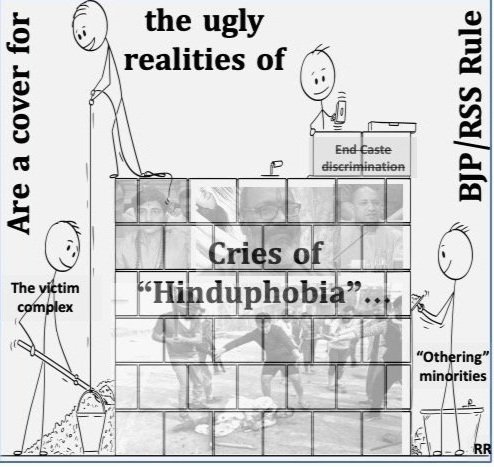On cries of “Hinduphobia”
Religiously motivated violence against Hindus is real in some parts of the world, but cries of “Hinduphobia” in the U.S. is a cover for surging violence against Muslims and Christians in India
Hindus for Human Rights is always concerned about varying levels of discrimination faced by Hindus around the world: Discrimination faced by Hindus living in the global diaspora, based on the experience of being a religious and/or racial minority in their respective societies. In the United States and Western countries, this means majority-white, majority-Christian societies. And discrimination and/or violence faced by Hindus in South Asian countries such as Pakistan and Bangladesh, where there is a documented history of systemic persecution of Hindus and other religious minorities.
But we reject the notion of systemic “Hinduphobia” in the United States or India with any equivalence to Islamophobia or anti-Semitism. We recognize that the term “Hinduphobia” has been popularized among Hindu nationalist groups in the United States -- not by persecuted Hindu populations in Pakistan or Bangladesh, who face violence based on their religious identity.
In light of recent events threatening freedom of speech, we emphasize that mere criticism of caste, Hindu nationalism, or Hinduism itself -- especially when it comes from marginalized communities -- should not be construed as anti-Hindu sentiment.
Hindus for Human Rights condemns all acts of hate based on someone’s identity or perceived identity, including one’s faith, regardless of the identities of the perpetrator and the victim. But we also strongly oppose willful propagation of an exaggerated sense of victimhood led by certain Hindu organizations.
Their narrative that there is wide-spread “Hinduphobia” in America is deeply troubling on several fronts:
1. Labelling specific individuals who oppose Hindu nationalism as “Hinduphobic” has often led to trolls, death threats, and rape threats against such individuals and their families, especially journalists and academics.
2. Weaponizing the “Hinduphobia” narrative to oppose legal efforts to ban caste discrimination in the American workplace and educational settings is a great disservice to people from marginalized communities, who form a significant part of the Indian American diaspora. How could banning caste discrimination be “Hinduphobic,” when Dalit-American Hindus could benefit from it?
3. Finally, the “Hinduphobia” narrative is being deployed as political cover to defend the alarming rise in anti-Muslim an anti-Christian violence in India under the BJP rule – including open calls for mass killing of Muslims by certain Hindu religious leaders.
Thankfully, anti-Hindu hate crimes in the U.S. are the lowest among 35 communities being tracked by the FBI. We pray that it remains so. However, Our Sikh and Muslim brothers and sisters are experiencing many more acts of hate compared to Hindu Americans, and deserve greater empathy from the Hindu community.
Those who are misusing the term “Hinduphobia” to attack opponents are being disrespectful of all those who are actually encountering such acts of hate and bias.
In our view, one hate crime is one too many, and HfHR will continue to speak out against hate crimes directed at all communities, including Hindu-Americans. We strongly believe that one can’t condemn hate crimes against one community and then go on to support or tolerate hate against another community.
Defending Human Rights is not a zero sum game.
####
.

